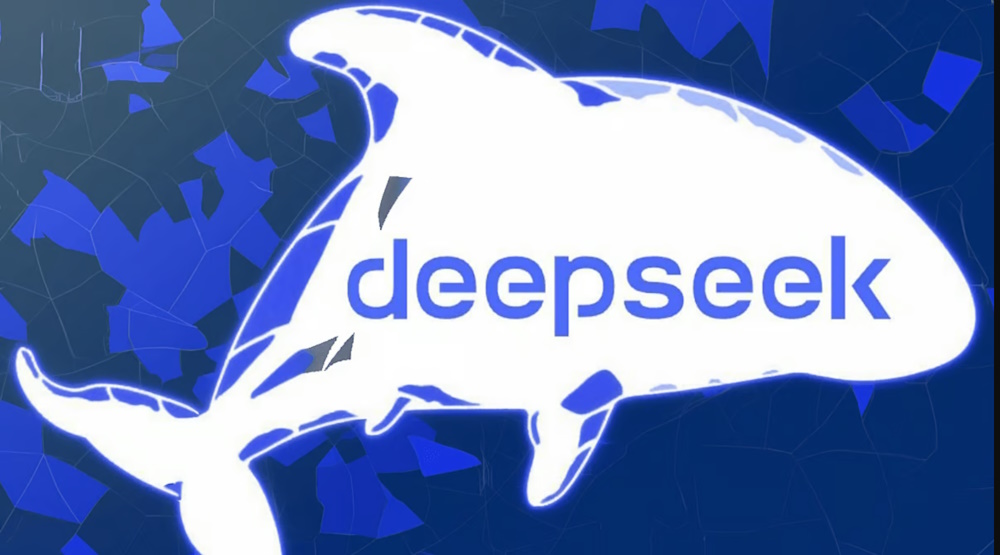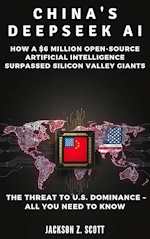 DeepSeek
DeepSeek
Meet the AI app that caused Wall Street to lose a trillion dollars in a day
Related: Chatbots | Prompt Engineering | Gemini | Copilot | ChatGPT | Claude | Grok
DeepSeek is a Chinese AI company founded and financed by Liang Wenfeng, the co-founder of the Chinese hedge fund High-Flyer. The company, based in tech-rich Hangzhou, China, made headlines for its cost-effective, high-performing AI models.
DeepSeek is open-source, a top mobile app, and into research on artificial general intelligence (AGI). DeepSeek's team consists of young, talented graduates from top Chinese universities, mostly Ph.D.'s, a group of highly skilled individuals with a keen perspective on AI development.
DeepSeek's models captured public attention with the release of DeepSeek-R1, leading to a sharp drop in the stock price of Nvidia, other chip makers, and related industries. DeepSeek's ability to develop high-performance models at a fraction of the cost challenged the belief that large investments in computing power is necessary for AI development. Nvidia is especially vulnerable as the leading AI chip manufacturer.
DeepSeek demonstrates how innovation in AI can come from unexpected places with talented leaders to shakeup the AI industry, particularly under the constraints of U.S. export controls on high-end computing chips to China.

 |
DeepSeek resources from Amazon
|
 History of DeepSeek
History of DeepSeek
A brief history of DeepSeek's journey to compete with the best
DeepSeek's story begins with the release of DeepSeek Coder in November 2023, an open-source model designed for coding tasks. This was followed by DeepSeek LLM, a 67 billion parameter model aimed at competing with other large language models.
DeepSeek-V2, launched in May 2024, gained significant attention for its strong performance and low cost, triggering a price war in the Chinese AI model market. This disruptive pricing strategy forced other major Chinese tech giants, such as ByteDance, Tencent, Baidu and Alibaba, to lower their AI model prices to remain competitive.
DeepSeek-V2 was succeeded by DeepSeek-Coder-V2, a more advanced model with 236 billion parameters. It is designed for complex coding challenges and features a high context length of up to 128K tokens. This model is available through a cost-effective API, priced at $0.14 per million input tokens and $0.28 per million output tokens.
The company's latest models, DeepSeek-V3 and DeepSeek-R1, have further solidified its position as an innovative leader. DeepSeek-V3, a 671 billion parameter model, boasts impressive performance on various benchmarks while requiring substantially fewer resources than its peers. DeepSeek-R1, released in January 2025, focuses on reasoning tasks and challenges OpenAI's o1 model with its advanced capabilities, developed at low cost. It is also the model that sank Wall Street for a day.
 Key Highlights
Key Highlights
DeepSeek's rapid rise underscores China's growing influence in AI
Within weeks of its release, DeepSeek-R1 surpassed ChatGPT to become the most-downloaded free app on the iOS App Store in the U.S. The emergence of DeepSeek has had a profound effect on global tech markets. On January 27, major U.S. tech companies, including Nvidia, Microsoft, and Tesla, experienced significant stock declines, collectively losing over $1 trillion in market value. AI chipmaker Nvidia plunged 17% while its rival Broadcom slumped 17.4%. Other tech firms also sank, with Microsoft down 2.14% and Google's owner Alphabet down over 4%. In Europe, Dutch chip equipment maker ASML saw its share price slip by more than 7% while shares in Siemens Energy, which makes AI related hardware, plunged by 20%.
Liang Wenfeng's DeepSeek-R1 was reportedly developed at a fraction of the cost of its competitors, yet matching or in some cases excceeding the performance of leading AI models like ChatGPT. This achievement is extraordinary given U.S. sanctions aimed at restricting China's access to advanced Nvidia AI chips. Liang reportedly built up a store of Nvidia A100 chips, now banned from export to China, and used this cache of over 50,000 chips to power DeepSeek. The initiative allowed DeepSeek to pair these chips with cheaper, lower-end chips that are still available to import.
We didn't expect pricing to be so sensitive to everyone. We were just doing things at our own pace and then accounted for and set the price. Our principle is that we don't subsidize nor make exorbitant profits. This price point gives us just a small profit margin above costs.
DeepSeek has made its AI chatbot open-source, allowing developers worldwide to access, modify, and build upon its code. Open-source models offer transparency, flexibility, and cost savings. The source code is accessible to everyone, which fosters trust and allows for thorough scrutiny. Open-source projects often benefit from contributions from a global community, leading to rapid innovation and improvement. The software is free to use, which can significantly reduce costs for individuals and organizations. Users can modify the code to suit their specific needs, offering a high degree of flexibility. Finally, with many eyes on the code, vulnerabilities can be identified and quickly patched.
 Challenges to DeepSeek
Challenges to DeepSeek
DeepSeek's success has prompted discussions about the shifting dynamics in the AI industry, challenging the perceived technological lead of U.S. companies.
Some have argued it's a "Sputnik moment", referring to a point when people realize they are challenged and need to redouble their efforts to catch up. The term comes from the time when the Soviet Union launched the first satellite, Sputnik 1, beating the USA into space. It is used here to describe the need for the U.S. to catch up in AI and potentially launch a new "space race" over AI. DeepSeek may be caught in the middle of a high-stakes battle over AI supremacy.
DeepSeek has faced criticism over its handling of sensitive topics. The chatbot has been observed to avoid or deflect questions that could be politically sensitive to the Chinese government. These topics include the 1989 Tiananmen Square protests, President Xi Jinping, and the status of Taiwan. Key questions are does this bias in training extend to other cultural matters and to what extent.
Following its surge in popularity, DeepSeek experienced a cyberattack, described as "large-scale malicious attacks" on its software. The attacks caused the company to temporarily limit new user registrations. DeepSeek may need to allocate resources to protect itself from future cyberattacks.
Like Tik Tok, there are concerns that DeepSeek could prove to be a national security threat or that the Chinese state may be seeking to gather intelligence and data from users in the U.S. and other markets, even though it does not own the app itself or its parent company.
 Links
Links
News Reports
bbc.com/news/articles/c0qw7z2v1pgo
cnbc.com/2025/01/27/chinas-deepseek-ai-tops-chatgpt-app-store-what-you-should-know
apnews.com/article/deepseek-ai-china
nbcnews.com/business/markets/tech-stocks-react-chinas-deepseek-sparks-us-worries-ai-race
the-sun.com/tech/13393836/chinas-ai-deepseek-chilling-responses-human-rights
nypost.com/2025/01/27/business/nvidia-shares-fall-12-as-chinese-ai-startup-deepseek-triggers-panic
DeepSeek Technical
relevanceai.com/llm-models/explore-deepseek-v25-for-better-data-insights
getguru.com/de/reference/deepseek
en.wikipedia.org/wiki/DeepSeek